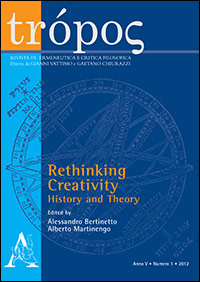Creativity as Agatopoièsi
The Experience of Formativity in Plato's Philosophy
DOI:
https://doi.org/10.13135/2036-542X/7614Keywords:
téchne, individuality, Good, form, imageAbstract
Creativity can be regarded as the faculty of producing a work which manifests itself both as eminently individual and as revealing the individuality of its own Sitz im Leben, as well as of its author. This paper attempts to illustrate how the notion of art (téchne) presupposed by Plato – notwithstanding its inapplicability to current discourses on aesthetics – implies significant analogies with the just articulated idea of creativity. Paradoxically enough for contemporary aesthetics, those analogies base on the metaphysical background entailed by Plato’s concept of art. Since, according to that concept, its essence consists in producing manifestations of the good, art indeed involves for Plato an intrinsic relation with a direct knowledge of the Absolute. Nevertheless, in Plato’s perspective this does not represent a limitation. In fact, Plato perceives the Good as transcending every being, so that through a relation to it a complete absence of conditioning both in thought and action is attained. Only this state of authentic liberation leads to an activity capable of transcending every norm, and is able to culminate in a work that we can consider as substantiation of creativity.


